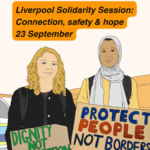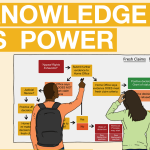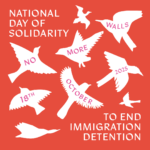
On 25th March 2025, Right to Remain hosted a Knowledge is Power workshop as part of the Stand up Speak Out seminar series, organised by Migrants Organise and Solidarity Knows No Borders. We are grateful to the organisers for inviting us to run this session and for facilitating this event series this year. Check out the full programme here.
Knowledge is Power is an entry-level workshop, designed to give an introduction to Right to Remain and our resources for people who have limited knowledge of the asylum and immigration system. In this session, we ran a condensed version of our usual Knowledge is Power workshop to fit into 1 hour. We were joined by 52 participants from all over the UK, including people in public sector roles, housing charities, and youth organisations. Many people who joined our session had not heard of Right to Remain before signing up for the session, so this session offered a perfect opportunity to introduce ourselves to a new audience.
What happened in the session?
In the session, we introduced Right to Remain and our key resource: the Right to Remain Toolkit. We think it is important for people to feel ownership of the Toolkit, as it is a resource that belongs to everyone. For this reason, we explained the 5 key tips for sharing the Toolkit, and then led an interactive exercise which encourages participants to practice using the Toolkit themselves. Using the search bars on every page, you can search Toolkit and Right to Remain website for information on specific topics. The idea is to make sure that participants are familiar with the Toolkit, and can have a go using the resource on their own device.
After that, we also highlighted another Right to Remain resource: the Asylum Navigation Board. This is a physical resource, as well as an online resource which shows the stages of the asylum process in a clear visual format. It is designed to be used with another person, and there are problem and action cards at every stage of common problems which occur at each stage.
After that, we introduced the difference between legal advice and legal support. This exercise is designed to help people appreciate the importance of the distinction between legal advice and legal support. Giving immigration legal advice when you are not qualified is an offence, and can only be provided by people who are qualified or accredited to do so.
Legal support can be provided by anyone, and we invite you to share Toolkit as a form of legal support.
Feedback
At the end of the session, we asked participants to tell us what they would do with the information they had learnt today. We received the following responses:
Share the Toolkit with organisations I volunteer at.
I will be able to use the Toolkit more confidently.
I have a UASC carers meeting tonight and will share the info so that they can be better informed. I will also share the information with adult asylum seekers that I know. This has been very very helpful.
Promote the Right to Remain Toolkit with the young people I work with and use it as guidance for myself to provide legal support
It will be a massive help for me to use this to support my UASC boys in our placement – Thank you!














Discussion: